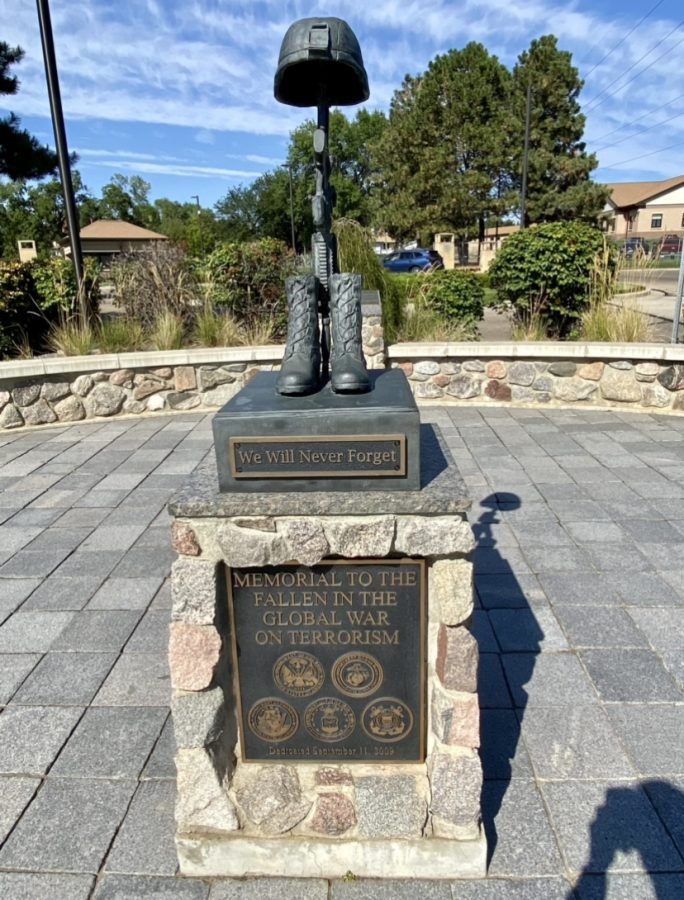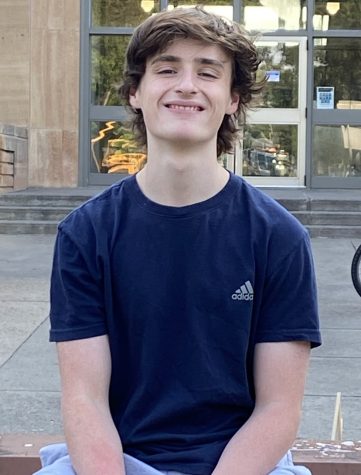9/11 20th anniversary
America still mourns the losses of those lost on the September 11 attacks, even 20 years later.
Memorial to the fallen in the global war on terrorism, located near Fraine Barracks, Bismarck, North Dakota.
September 29, 2021
In the early morning of September 11th, 2001, the world was sent into shock as a plane had struck the North Tower of the World Trade Center. Americans across the country paused their normal morning routine and turned on the news to see the fatal accident live, only to witness the second plane hit the South Tower. Immediately after, all of America knew it was not an accident but a coordinated attack on U.S. soil.
20 years later the impact that 9/11 left is still reminiscent. What once were two towers that symbolized “globalization and America’s power and prosperity” were now only left to be remembered. Jason Fritz, a Spanish teacher at BHS, recalls the perplexity of hearing the initial reports that a major accident had occurred in New York City.
“I was teaching at St. Mary’s High School at the time and a student came into my classroom and said that a plane had hit a building in New York City,” Fritz said. “I immediately wondered how that could happen. A short time later more students came into the room and said that a second plane had hit another building. We all became suspect that something serious was happening. We turned on the one small TV that we had in our room and watched the news for the rest of the period. There was a mixture of curiosity, sadness and anxiety amongst all of us. It was hard to think of anything else at the time.”
All day, TV was nonstop coverage of the tragic events. It wasn’t long after soon people heard about a plane hitting the Pentagon, and one having crashed into a Pennsylvania field that was on a trajectory toward the U.S. Capitol Building.
“I gave the students an assignment and left the news station on for the remainder of the day for all of my classes,” Fritz said. “In retrospect, I would have done differently. Most of America was saturated with the coverage for hours, days and weeks. I didn’t know how sensitive – especially the news outlets – we were towards those who were impacted. I can’t imagine what it would have been like to be a family member of someone killed or injured at ground zero of the crashes and have to relive it for days, weeks and months after with all the media coverage.”
An overwhelming amount of shock was the first rush of emotions many felt when watching the events unfold on TV. The images of people on the streets in New York City doing everything they can to not only save their own lives but the lives of others were unifying. Melissa Davis, a global studies teacher at BHS, remembers the initial confusion after the first plane hit the North Tower.
“When 9/11 happened that morning, I was in a microbiology lab class at Bismarck State College,” Davis said. “And I remember we were just starting our lab, me and my lab partner. And the teacher had wheeled in a TV cart and was like, ‘there’s something going on in New York. I’m just going to leave this plugged in so you guys can watch it as you’re working on your lab class. The situation is still unfolding, we don’t really know a lot’ and so my lab partner and I were like ‘okay, well, whatever.’ We’ll just keep going with our lab, it didn’t seem like a big deal.”
Uncertainty and questions of “why” filled the minds of many. The surreality of seeing an American landmark emit large amounts of fire and black smoke from what initially seemed like a tragic accident was overwhelming. It was not until 17 minutes later until all of America knew that it was not an accident.
“After the first plane struck, we were just kind of watching it sort of in the background like ‘That’s really weird.’ And then the second plane struck,” Davis said. “We were still in that same lab class, and so basically after the second plane struck, the teacher came in kind of frazzled and was like, ‘the Dean said that we’re letting all students go home, this is a terrorist attack.’.”
After processing what happened, the question of, “What do we do now?” had to be asked. The blindsided attack emotionally vaulted many Americans to enlist into the armed forces. According to United Service Organizations, 181,510 Americans joined the U.S. Army. Many people felt the need to join as the U.S. was facing the threat of a global war on terrorism.
“And then that was like, my first couple years of college and I had a lot of friends that wanted to enlist,” Davis said. “And so I very much remember getting together with friends and they were talking about things like ‘We’re gonna enlist’, ‘We’re going to get revenge’, ‘We’re going to go back over there.’ So just the climate, the fear and the spirit of like ‘let’s come together’ as Americans and defend ourselves and protect ourselves from this. It was all really clear.”


